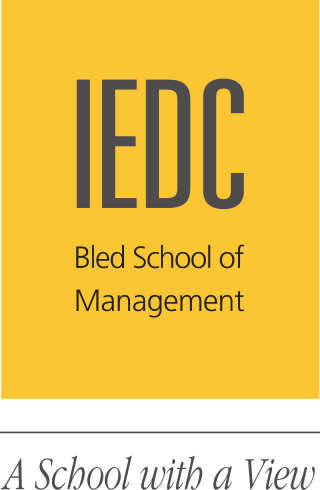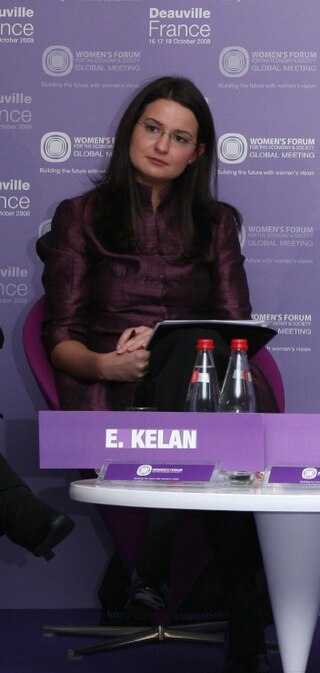Related Research Articles

Corporate social responsibility (CSR) or corporate social impact is a form of international private business self-regulation which aims to contribute to societal goals of a philanthropic, activist, or charitable nature by engaging in, with, or supporting professional service volunteering through pro bono programs, community development, administering monetary grants to non-profit organizations for the public benefit, or to conduct ethically oriented business and investment practices. While once it was possible to describe CSR as an internal organizational policy or a corporate ethic strategy similar to what is now known today as Environmental, Social, Governance (ESG); that time has passed as various companies have pledged to go beyond that or have been mandated or incentivized by governments to have a better impact on the surrounding community. In addition, national and international standards, laws, and business models have been developed to facilitate and incentivize this phenomenon. Various organizations have used their authority to push it beyond individual or industry-wide initiatives. In contrast, it has been considered a form of corporate self-regulation for some time, over the last decade or so it has moved considerably from voluntary decisions at the level of individual organizations to mandatory schemes at regional, national, and international levels. Moreover, scholars and firms are using the term "creating shared value", an extension of corporate social responsibility, to explain ways of doing business in a socially responsible way while making profits.

The United Nations Global Compact is a non-binding United Nations pact to get businesses and firms worldwide to adopt sustainable and socially responsible policies, and to report on their implementation. The UN Global Compact is the world's largest corporate sustainability and corporate social responsibility initiative, with more than 20,000 corporate participants and other stakeholders in over 167 countries. The organization consists of a global agency, and local "networks" or agencies for each participating country. Under the Global Compact, companies are brought together with UN agencies, labour groups and civil society.
Henri-Claude de Bettignies is a French professor of business. He holds the EU Chair for Global Governance and Sino-European Business Relations at the China Europe International Business School (CEIBS), is director of the Europe China Center for Leadership and Responsibility. He is AVIVA Chair Professor of Leadership and Responsibility at INSEAD, specialized in Asian business, leadership, business ethics and corporate social responsibility. He is one of the longest-serving faculty at the INSEAD MBA Programme, where he coordinates several executive education programs.

The Global Reporting Initiative is an international independent standards organization that helps businesses, governments, and other organizations understand and communicate their impacts on issues such as climate change, human rights, and corruption.

Güler Sabancı is a Turkish businesswoman, a third-generation female member of the Sabancı family, and the chairperson of the family-controlled Sabancı Holding, the second-largest industrial and financial conglomerate in Turkey. As of 2020, she is listed as the 76th most powerful woman in the world by Forbes, which first recognized her in 1999.
Emerald Publishing Limited is a scholarly publisher of academic journals and books, headquartered in Leeds, England. Originally focused in the areas of social sciences and management, including management, business, education, and library studies, Emerald also publishes in the areas of health, science, engineering, and technology.

IEDC-Bled School of Management, located in Bled, Slovenia, is a business school. It was founded in 1986 upon an initiative of Slovenian business community as the International Executive Development Center.

Business School Lausanne (BSL) is a private business school located in Lausanne, Switzerland. It is part of the Lemania Group of Swiss Private Schools.

Elisabeth Kelan is a Professor of Leadership and Organisation at Essex Business School and Director of the Cranfield International Centre for Women Leaders at Cranfield School of Management. Prior to that she was an Associate Professor in the Department of Management at King's College London and Senior Research Fellow in the Centre for Women in Business at London Business School, founded by Laura D’Andrea Tyson. She also worked at the Gender Institute of the London School of Economics and Political Science (LSE) where she received her PhD.

Klaus M. Leisinger is a social scientist and economist. He is founder and president of the Global Values Alliance in Basel. Until 2012 he was managing director and chairman of the Board of Trustees of the Novartis Foundation in Basel, Switzerland.

The CBS International Business School (CBS) is a state-recognised, private business school which emerged in 2020 from the individual brands Cologne Business School (CBS) and European Management School (EMS). At its locations in Cologne, Mainz, Potsdam, Aachen, Brühl, Neuss and Solingen, it offers approximately 3,000 students its predominantly English-language business management study courses with the academic degrees Bachelor of Arts, Bachelor of Science, Master of Arts, Master of Science and MBA. The CBS Cologne Business School GmbH is the responsible body of the university.
A sustainability organization is (1) an organized group of people that aims to advance sustainability and/or (2) those actions of organizing something sustainably. Unlike many business organizations, sustainability organizations are not limited to implementing sustainability strategies which provide them with economic and cultural benefits attained through environmental responsibility. For sustainability organizations, sustainability can also be an end in itself without further justifications.
Teach For All is a global network of 61 independent, locally led and funded partner organizations whose stated shared mission is to "expand educational opportunity around the world by increasing and accelerating the impact of social enterprises that are cultivating the leadership necessary for change." Each partner aims to recruit and develop diverse graduates and professionals to exert leadership through two-year commitments to teach in their nations' high-need classrooms and lifelong commitments to expand opportunity for children. The organization was founded in 2007 by Wendy Kopp and Brett Wigdortz. Teach For All works to accelerate partners' progress and increase their impact by capturing and sharing knowledge, facilitating network connections, provisioning global resources, and fostering leadership development of staff, teachers, and alumni.
Fondation Guilé is a Swiss foundation. This non-profit organization of Swiss private law has been founded in 1997 by the Charles Burrus family headquartered in Boncourt, Switzerland. The foundation’s mission is to promote corporate responsibility in the process of globalization, focusing on human and labour rights, environmental protection and business ethics. The foundation supports and promotes the ten principles of the United Nations Global Compact through the engagement with companies about their sustainability and corporate responsibility efforts and by organizing high-level events on the topic. The foundation defines its role as “catalyst in helping companies implement and report on the ten principles of the Global Compact” according to the founders Nado and Charles Burrus.

The United Nations Environment Programme Finance Initiative is a partnership between the United Nations Environment Program (UNEP) and the global financial sector to catalyse action across the financial system to align economies with sustainable development. As the UN partner for the finance sector, they convene financial institutions on a voluntary basis to work together with them, and each other, to find practical solutions to overcome the many sustainability challenges facing the world today. UNEP FI does this by providing practical guidance and tools which support institutions in the finance sector to find ways to reshape their businesses and commit to targets for limiting greenhouse gas emissions, protecting nature, promoting a circular economy and supporting financial inclusion to address inequality. The solutions developed effectively form a blueprint for others in the finance sector to tackle similar challenges and evolve their businesses along a sustainable pathway. The creation and adoption of such a blueprint also informs policy makers concerned with sustainability issues about what would constitute appropriate regulation for the finance sector at large. Founded in 1992, UNEP FI was the first organisation to pioneer engagement with the finance sector around sustainability. The Finance Initiative was responsible for incubating the Principles for Responsible Investment and for the development and implementation of UNEP FI’s Principles for Responsible Banking and Principles for Sustainable Insurance as well as the UN-convened net-zero alliances. Today, UNEP FI provides sustainability leadership to more than 400 financial institutions, with assets of well over $80 trillion headquartered around the world.
Georg Kell is the founder and former Executive Director of the United Nations Global Compact. He is also the Chairman of Anglo-German asset manager, Arabesque Partners.

Greenleaf Publishing is a UK-based publishing imprint specializing in corporate responsibility, business ethics, environmental policy and management, future business strategy and practice, and sustainable development. Founded in 1992 as an independent publisher, the company became part of GSE Research Limited, an online scholarly publisher specializing in governance, sustainability and the environment, in 2012. In 2017, the company was sold to Taylor & Francis and became part of its Routledge imprint.

Together for Sustainability AISBL (TfS) is a joint initiative of chemical companies, founded in 2011. It focuses on the promotion of sustainability practices in the chemical industry's supply chain, currently gathering chemical companies around a single standard of auditing and assessment.

The United Nations SDG Publishers Compact is a non-binding United Nations pact open to publishers, associations, booksellers and other organizations involved in the publishing industry, in support of the United Nations 17 Sustainable Development Goals (SDGs). Research and education is important to making progress toward achieving the 17 development goals.
Debra Rowe is a professor at Oakland Community College in Oakland County, Michigan, who is known nationally and internationally for her work in education and sustainability, Much of her work explores the role of community colleges and other higher education institutions as leaders in educating a population and a workforce that can support the development of a green economy and meet sustainability goals. Rowe has taught classes in energy management, renewable energy, and psychology.
References
- ↑ "Vision & Mission". GRLI. Retrieved 2016-11-08.
- ↑ "Our Network | the GRLI".
- 1 2 3 "Globally Responsible Leadership Initiative (GRLI)". LinkedIn. Retrieved 2016-11-08.
- ↑ "Globally Responsible Leadership Initiative (GRLI) – United Nations Partnerships for SDGS platform".
- ↑ "Strategic Partners". GRLI. Retrieved 2016-11-08.
- ↑ "GRLI In Brief". GRLI. Retrieved 2016-11-08.
- ↑ Andreas Rasche; Georg Kell (16 June 2010). The United Nations Global Compact: Achievements, Trends and Challenges. Cambridge University Press. p. 177. ISBN 978-0-521-14553-4.
- ↑ Robert C. Chandler (10 March 2014). Business and Corporate Integrity: Sustaining Organizational Compliance, Ethics, and Trust [2 volumes]: Sustaining Organizational Compliance, Ethics, and Trust. ABC-CLIO. p. 151. ISBN 978-0-313-39598-7.
- ↑ "Globally Responsible Leadership Initiative". Berkley Center for Religion, Peace & World Affairs. Retrieved 2016-11-08.
- ↑ "Journal of Global Responsibility". Emerald Group Publishing . Retrieved 2016-11-08.
- ↑ "Sustainability Accounting, Management and Policy Journal". Emerald Group Publishing. Retrieved 2016-11-08.
- ↑ "Leading global networks initiate Collaboratory for responsible management education". GRLI. Retrieved 2016-11-08.
- ↑ "Share Your AIM2Flourish Nominations Ideas". AIM2Flourish. Retrieved 2016-11-08.
- ↑ "Globally Responsible Leadership – A call for engagement". GRLI. Retrieved 2016-11-08.
- ↑ The Globally Responsible Leader. A Call for Action Archived 2016-11-09 at the Wayback Machine , GRLI, 2009, ISBN 978-1-871992-53-3, page 2.